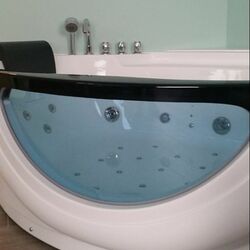 Clear birth tub at The Birth Center of NJ. Clear birth tub at The Birth Center of NJ.
Below is a database of waterbirth tubs and labor tubs in northern NJ for those researching options - sometimes referred to as aquatherapy or hydrotherapy (please click on the individual record to open the image link).
As you can imagine, water is wonderful for creating more buoyancy for the birthing person. Another added benefit is that is creates a little bubble of a birthing space for the birthing person. Places with the most options include: The Birth Center of NJ and Our Birthing Center and Morristown Medical Center. Please note that some of the hospitals will say they have waterbirth tubs, but they may ONLY have inflatable tubs that rarely see the light of day. 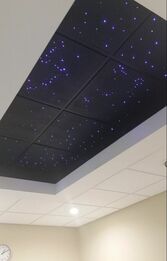 Celestial skyscape overhead at The Birth Center of NJ. Celestial skyscape overhead at The Birth Center of NJ.
Also, please note that if you wish to birth in a hospital tub, you will need to check with your provider if they will catch your baby in the tub or will want you on the bed for the actual delivery. Oftentimes, the birthing person does not think they want to birth in the tub, but then regret not lobbying for the option, because they felt disturbed having to get out of their birthing space in the tub (something to think about and chat with your partner and doula about).
In addition to the Birth Centers and Hospitals, Homebirth is another wonderful option for waterbirth and many people arrange to have an inflatable tub brought into their home. Feel free to get in touch with Rachel (via the contact page) if you have any questions or want her to find more info for home, hospital, or birth center. Good luck researching your waterbirth options!
Instructions for Database:
- Click on record to see more info. - Scroll down to view all records. - Send us any updates. Thanks!
If you have updates to this database or have updated links for images, please let us know. Thanks!
3 Comments
Not everything comes naturally but that is no reason to be discouraged from pursuing something you want to pursue.
Sometimes we need to learn the basic skills first in order to feel comfortable enough to let our intuition really flow and to allow things to come naturally – to have the ability to “just know” something without any proof or evidence. Take a chef for example – to be able to say “oh I just added a touch of this and stirred in a little bit of that” is usually from years of trial and error – from souring sauces and burning side dishes. Now they can play around with seasonings. Or consider a businesswoman who says, “I followed my gut” or “I had a hunch about that deal” – it’s often from years of experience and observing behavior, analyzing metrics, and taking risks. They already know how far they can push things and what the likely outcome will be. Intuition as a learned skill applies to business and creative pursuits as well as many of other vocations – and in my personal experience, it applies to working as a birth doula in northern New Jersey. As a birth doula, a woman who supports and serves women in childbirth, it was frustrating when I started to have more-experienced doulas tell me – “just to follow your intuition”. I would think–I have no idea where this intuition, you speak of, starts or where it leads, so can you please provide me a little direction? When I started as doula, I would always do a simple hip squeeze – placing my hands on either side of mom’s hips, applying pressure to relieve pain and tension. I did this repeatedly because neither my skills nor intuition was guiding me anywhere else. About a year ago I participated in a workshop where we learned in-depth information about positioning for mother and baby and am now able to follow my intuition more. The workshop changed by practice. Knowing more helped me be more intuitive. Now when I support a mother – I know to breath out any tension and let any thoughts go from my own mind – to leave the suitcase at the door. I listen to what comes intuitively - to the sounds of the birthing space and the birthing woman. Tuning in helps me listen to the sounds of her movements – whether they be tired, tense, relaxed, imminent. I can sense her clenched jaw and gently rub her jawbone to provide release. I can tell she is hold tension in her pelvic area by how she paces and positions herself during contractions – and can gently place my hands on her sacrum to offer her release and support. Are her legs tired from standing all night? I can feel if her muscles are taught or wilted and go on to provide a gentle foot massage or little wiggle to shake out her lax limbs. It took me years of building my knowledge and skills to get to the point where I felt I could follow my intuition but now I feel confident to enter the space of a birthing woman and close my eyes and listen to the space and to what her body is telling me – where her body is guiding my hands to go, to be intuitive. To “just know.” So if this skill of intuition was there all along and is available to all of us - how can we hone it? How can we simply be more attuned and responsive to the subtle clues we receive? Scientific America Magazine wrote that intuition is linked to the basal ganglia area of the brain – an area that controls fast, automatic, cognitive operations. So it would make sense that to hone our intuition we need to improve or maintain our brain health. As many studies show – brain health can be maintained with good diet, exercise, plenty of sleep, and clearing the mental clutter. To be a good listener and more intuitive, it is important to turn off the chatter in our brains. We can do this using meditation or periods of silence and solitude where we focus on our breathing or something that brings us peace. In order to be better listeners in our environments, we need to turn off the noise. So intuition may not be a mystical thing for all of us. If we are experts or even very experienced in our fields – it may be a matter of just connecting the constellation of silent clues we receive in order to yield an intuitive response. Being intuitive can be a wonderful, freeing feeling. I will never, ever say to a doula starting out – “oh just follow your intuition” as if they already have that roadmap. For some of us, it is only possible to follow our intuition after we have created a map that charts skills, knowledge and experience. Only then can we can paint with broad brush strokes of intuition over the charted ones. As Picasso says, “It took me four years to paint like Raphael, but a lifetime to paint like a child.” Fellow doulas, what helped you to follow your intuition more? Photo shared with permissions. PC: Rachel Connolly Kwock. Feat.: Doula Holly Graff & Midwife Donna Tabas. Clients often ask if I can provide them with a receipt that they can submit to insurance. Yes, I can, but you will want a back-up plan. Doulas are not automatically covered by insurance although many people feel they should be. Choices in Childbirth (CiC) put out a big report on this topic earlier this year, Overdue! Insurance Coverage of Doula Care. Warning: it's complicated. In the report they say, “Private insurance plans should include services of a trained doula as a covered service, and state legislatures should pass legislation mandating private insurance coverage of doula services, as they have done for a broad range of services." Even in states where there are programs and the insurance companies are supposed to reimburse (the only states being Oregon and Minnesota), it is not a slam-dunk, “At this time, few doulas, if any, have actually received reimbursement in either Oregon or Minnesota.”
So some people try to get covered with some effort. For this, the doula needs to provide an itemized receipt. The theory is that there are insurance companies that cover support services that fall into a second tier of health options such as therapeutic massage, gym memberships, breast pumps, lactation consultants and doulas, and typically the companies require the insured to provide paperwork and receipts. As an example of how to submit, DONA offers this DONA 3rd party reimbursement manual, but keep in mind it needs updating as it still includes CPT code, which I will go into below: http://www.dona.org/PDF/3PRSampleLetter.pdf. As doulas, we can provide a detailed receipt including our National Provider Identification (NPI#) and a description of services. As per describing services - I have not heard of the insurance companies being impressed with doulas describing relaxation and pain-coping techniques or that doulas are preventive medicine and statistically reduce the need for expensive surgeries and epidural anesthesia. The companies seem to better respond to tangible services they are familiar with, such as childbirth education and breastfeeding support. Anecdotally, I have heard of a doulas being reimbursed when the provider signs a letter of medical necessity, including a medical code, indicating labor support increases the chances of the patient having an unmedicated birth with no pain management (I guess if it's doctor's orders then it is taken more seriously). What is this secret code you ask? Midwives and Doctors can offer CPT code 99499, since they are medical, but since doulas are not medical we cannot offer this same code. Per DONA, “As of this date, there is no national CPT (current procedural terminology) code for doulas.” So doulas cannot sign-off on this type of letter/receipt because doulas are not medical therefore we do not have a diagnosis code. Having a provider sign-off on our services is not realistic option for most of us since we are hired by the client and not by the provider, but there are offices in my home turf of northern NJ that have doulas on staff, such as Wombkeepers and Midwives of NJ. So what are the options? Some clients have been able to use their Health Savings Account (HSA) accounts and Flexible Spending Accounts (FSA), that can reimburse an individual or help one pay for eligible health care expenses not covered by one's health plan. Typically, the amount designated from your paycheck, that you put into your FSA, is taken out pre-tax. You will still need a receipt with NPI# and description of services for this purpose. In closing... The insurance piece is going to take some time. Feel free to get involved by raising awareness via the CiC report or by contacting the rep at your doula organization who handles insurance questions. Personally, I don't recommend clients invest too much time with insurance. As for women who cannot afford a doula - recommend saving, offer a payment plan, request money for doula-savings at their baby shower/registry, ask a doula to barter services. Also, there are always student doula training and attending births, as they work towards their certification. To find these doulas just look on doulamatch and see how much they charge – rates often correlate with experience. What is your experience with insurance reimbursement for doulas and what are creative ways you've heard of how people afford a doula? How do you respond when people ask if you provide insurance? I hope to read your response. _______________________________________ If you are interested to read the full report, visit Choices in Childbirth's Toolkit Overdue Medicaid and Private Insurance Coverage of Doula Care to Strengthen Maternal and Infant Health http://choicesinchildbirth.org/our-work/advocacy-policy/doulacoverage/. |
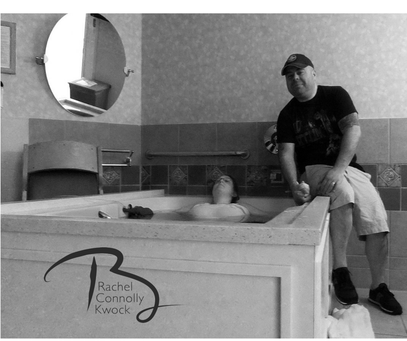
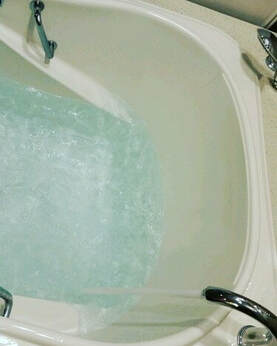
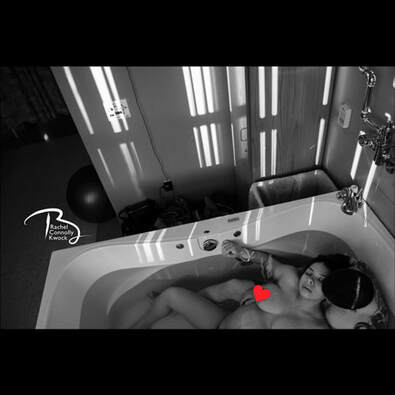
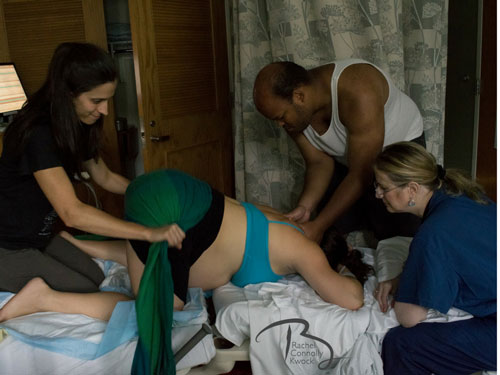
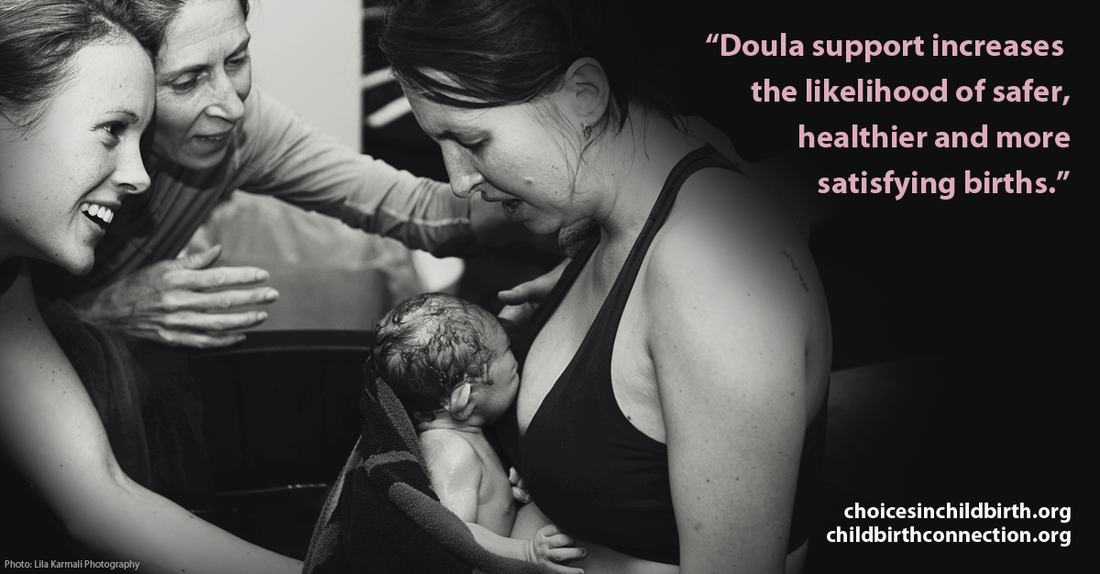
 RSS Feed
RSS Feed